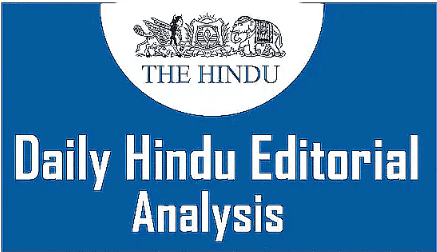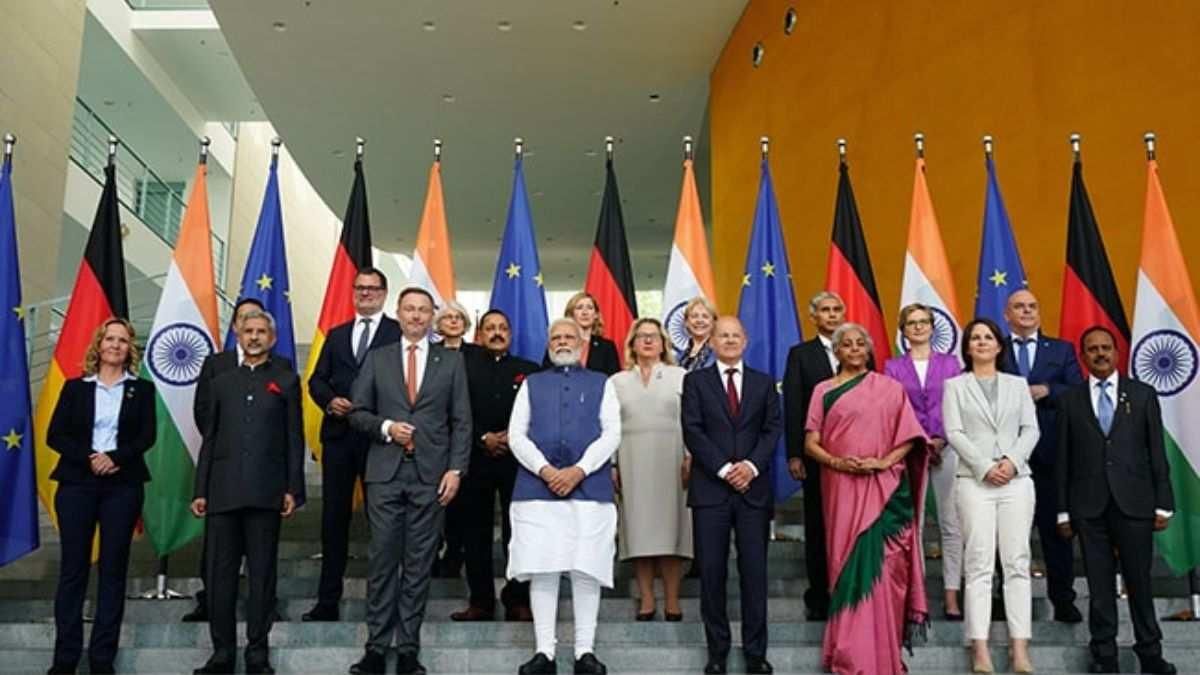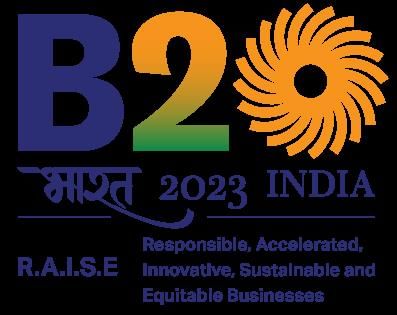The Hindu Editorial Analysis- 21st October 2024 | Current Affairs & Hindu Analysis: Daily, Weekly & Monthly - UPSC PDF Download

Essential business priorities in a changing world
Why in News?
Following the multiple exigencies of the recent past, the global economy appears to have stabilised this year, albeit with geopolitical risks remaining on the horizon. The G-20 economies displayed different growth rates in the first quarter of the year, with some growing more rapidly than expected, while others experienced setbacks. Within this scenario, businesses of the world have the potential to leverage new opportunities for growth and benefit from wider dispersal of developmental gains.
- G20, or Group of Twenty, is a global group made up of governments and central bank leaders from 19 countries and the European Union.
- It was created in 1999 to tackle worldwide economic and financial challenges.
- The main goals of the G20 include:
- Addressing global economic issues
- Promoting financial stability
- Encouraging sustainable and inclusive economic growth
- The G20 serves as a platform for member countries to:
- Discuss important topics
- Coordinate policies that affect the global economy
- Through these efforts, the G20 plays a crucial role in shaping the global economy.
History of G 20
- The G20 was created after the Asian financial crisis that occurred between 1997 and 1998.
- This crisis highlighted the need for better cooperation among major economies to deal with global economic issues.
- Initially, the G20 was a meeting place for finance ministers and central bank governors.
- In 2008, the G20 was elevated to a leaders' summit in response to the global financial crisis.
- Since its upgrade, the G20 has been important in shaping the international economic agenda.
- It has also played a key role in coordinating global economic policies.
Member Countries of G 20
Country | Country | Country | Country |
Argentina | Australia | Brazil | Canada |
China | France | Germany | India |
Indonesia | Italy | Japan | Mexico |
Russia | Saudi Arabia | South Africa | South Korea |
Turkey | United Kingdom | United States | European Union |
Structure and Functioning of G20
- The G20 holds yearly meetings for Finance Ministers and Central Bank Governors, along with an annual summit for leaders.
- It has two main groups: the Finance Track and the Sherpa Track, both important for setting goals and plans during the time a country is hosting.
- The Sherpa Track involves representatives who work on different social and economic topics and manage discussions throughout the year.
- The Finance Track, which is led by Finance Ministers and Central Bank Governors, meets around four times a year to talk about financial and monetary policies.
- The G20 does not have a formal charter or secretariat, but it is supported by a group called the Troika, which includes the last, current, and next presidencies.
- Decisions made by the G20 are non-binding, meaning they are not legally required to be followed, and member countries do not have to implement them.
- Members of the G20 also work closely with international organizations like the IMF, World Bank, and WTO.
G20 Summit 2023
- The 18th G20 summit took place in New Delhi, India, where leaders from major global economies gathered.
- This important meeting lasted for two days, occurring on September 9-10, 2023.
- The summit was organized under the leadership of the Indian G20 presidency.
- During this time, there was a rise in political and economic competition among countries.
- Many leading and developing nations are forming new alliances around the world.
- The themes chosen by the Indian presidency highlight a focus on the Global South.
- A key decision made by G20 leaders was to grant permanent member status to the African Union (AU).
- This shows the growing importance that G20 members place on nations from the Global South.
Outcome of the G20 Summit 2023
G20 Summit Declaration
At the end of the New Delhi summit, all G20 members, represented by Charles Michel, the President of the European Council, and Ursula von der Leyen, the President of the European Commission, released a detailed declaration. In response to the six priorities set by India, which included green development, inclusive growth, and progress on the UN Sustainable Development Goals, leaders committed to taking action and establishing goals in a lengthy declaration with 83 paragraphs titled 'One Earth · One Family · One Future.' This declaration also addressed the EU's requests for reforming multilateral development banks and taking action on climate change, such as the goal to triple renewable energy capacity by 2030.
Key Commitments
- Accelerating the implementation of the 2030 Agenda for Sustainable Development.
- Agreement to triple global renewable energy capacity by 2030.
- Pursuing low-GHG/low-carbon emissions and climate-resilient development.
- Increasing funding for the Paris Agreement goals.
- Enhancing digital services and promoting inclusive growth.
- Closing gender gaps and empowering women in the economy.
- Advocating for reforms in the multilateral system and improving the effectiveness of multilateral development banks.
- Supporting a rules-based, fair, and transparent multilateral trading system with the WTO at its core.
Geopolitical Significance of G20 2023
- The absence of China's President Xi Jinping, who leads the world's second-largest economy, received a lot of media attention.
- There was speculation about why Xi did not attend. Possible reasons included:
- Tensions between India and China
- Challenges within China
- Discontent with the US-dominated G20, leading China to seek a new global governance approach
- Unlike the previous year's statement, the G20 New Delhi Leaders' Declaration did not directly condemn Russia.
- The declaration urged all countries to respect the territorial integrity and sovereignty of states.
- Russia's President Vladimir Putin was not present and was represented by Foreign Minister Sergey Lavrov, who deemed the summit a success.
- Ukraine criticized the final declaration of the G20 but expressed gratitude to its allies for their support.
- Significant emerging economies from the Global South, including India, Brazil, Indonesia, and South Africa, played a vital role in negotiating a compromise that allowed all G20 members to sign the final declaration.
- The decision to give permanent member status to the African Union, which represents 55 African nations, highlights the growing influence of emerging countries from the Global South.
Summits of G 20
- First G20 Summit: The initial G20 Leaders' Summit occurred in Washington, D.C., in November 2008. It aimed to tackle the global financial crisis and improve the international financial system through necessary reforms.
- Second G20 Summit: This summit was held in London in April 2009. Leaders promised to boost global growth, fortify financial systems, and offer more support to international financial institutions.
- Third G20 Summit: The third summit took place in Pittsburgh, USA, in September 2009. Leaders agreed to collaborate for a sustainable economic recovery and recognized the G20 as the main platform for global economic cooperation.
- Fourth G20 Summit: This summit occurred in Toronto, Canada, in June 2010. Leaders focused on fiscal discipline and reforms in the financial sector, highlighting the significance of sustainable development and reducing poverty.
- Fifth G20 Summit: The fifth gathering was in Seoul, South Korea, in November 2010. Leaders endorsed the Seoul Development Consensus for Shared Growth, which prioritized development, trade, and investment to facilitate global economic recovery.
- Sixth G20 Summit: This summit took place in Cannes, France, in November 2011. Leaders addressed the Eurozone crisis, enacted financial regulations, and approved a growth and job creation action plan.
- Seventh G20 Summit: The seventh summit was hosted in Los Cabos, Mexico, in June 2012. Leaders concentrated on boosting global economic resilience, promoting sustainable development, and enhancing international financial frameworks.
India and the G20
- As a prominent emerging economy, India plays a vital role in the G20.
- India consistently pushes for a more inclusive and balanced global economic system.
- The country emphasizes addressing challenges related to development, climate change, and financial stability.
- India's involvement in the G20 has influenced global economic policies to better reflect the needs and concerns of developing nations.
Why is the G20 Presidency so important for India?
- Global leadership: Holding the G20 Presidency gives India a special chance to demonstrate its leadership on the world stage. It allows India to influence and guide the global economic and policy agenda, establishing itself as an important player in the international arena.
- Economic development: As one of the fastest-growing major economies, India has a big interest in global economic stability and growth. The G20 Presidency allows India to advocate for its economic needs, such as trade, investment, and development strategies, aligning these with the wider global agenda.
- Promoting inclusive growth: India can leverage the G20 platform to advocate for policies that support inclusive growth and reduce inequality both within its own country and among the G20 nations. This is especially significant as India confronts major issues related to poverty, income disparity, and social progress.
- Climate change and sustainable development: As one of the largest producers of greenhouse gases, India plays a crucial role in tackling climate change. The G20 Presidency allows India to advance its priorities regarding climate change and sustainable development, such as renewable energy, and encourage joint action among member countries.
- Strengthening multilateralism: The G20 Presidency offers India the chance to promote cooperation and dialogue among member nations, reinforcing the significance of multilateralism in addressing global problems. This can help India build stronger partnerships and collaborative efforts with other nations.
- Addressing global challenges: The G20 forum enables India to engage in discussions and influence policies on a variety of urgent global issues, including financial stability, employment, healthcare, and education. By actively participating in these conversations, India ensures that its viewpoints are acknowledged and considered.
India's G 20 Priorities
- Infrastructure development and investment: Building and improving essential facilities and systems that support economic growth and community well-being.
- Financial inclusion and digitalization: Making sure everyone has access to financial services and using technology to make these services easier to obtain.
- Climate change and sustainable development: Addressing the impacts of climate change while promoting responsible use of resources for future generations.
- Global health and pandemic preparedness: Strengthening health systems worldwide to better respond to diseases and health emergencies.
- Reform of international financial institutions: Updating and improving global financial organizations to make them more effective and fair for all countries.
- Inclusive, equitable and sustainable growth: Promoting economic growth that benefits everyone, ensuring fairness and long-term sustainability.
- LiFE (Lifestyle For Environment): Encouraging environmentally friendly lifestyles that contribute to a healthier planet.
- Women’s empowerment: Supporting women to have equal rights and opportunities in all areas of life.
- Digital infrastructure: Developing the necessary technology and systems to support digital communications and services.
What is Business 20 (B20)? 
- B20 is the official dialogue platform for the global business community within the G20.
- The B20 plays a crucial role in bringing together the views of business leaders on global economic and trade issues.
- It serves as a unified voice for all businesses involved in the G20.
- Every year, a B20 Chair is chosen by the G20 Presidency, with support from a B20 Sherpa and a secretariat team.
- The mission of the B20 is to offer practical policy suggestions that match the priorities of the rotating presidency to promote economic development.
- The B20 works through Task Forces (TFs) and Action Councils (ACs) which focus on reaching agreement on policy recommendations.
- These policy suggestions are aimed at the G20 and various international organizations.
B20 India 2023 Theme:
- The theme for the B20 India is R.A.I.S.E., which represents Responsible, Accelerated, Innovative, Sustainable, and Equitable businesses.
- The goal is to work together with global partners in important areas such as:
- Inclusive global value chains (GVCs)
- Energy and climate change
- Digital transformation
- Financial inclusion
- The future of work
B20 India Members:
Argentina, Australia, Brazil, Canada, China, France, Germany, India, Indonesia, Italy, Japan, Republic of Korea, European Union, United States, United Kingdom, Türkiye, South Africa, Saudi Arabia, Russia, and Mexico.
Highlights of B20 India Summit:
- Caution Against Treating Countries as Markets:
- The Prime Minister of India warned global businesses not to see countries just as markets.
- He emphasized the need to balance the needs of both producers and consumers to maintain a successful market.
- Global Supply Chain Disruptions and India's Solution:
- He pointed out major disruptions in global supply chains after the Covid-19 pandemic.
- He questioned how efficient these supply chains were during critical times.
- India was presented as a reliable option to help fix these supply chain issues.
- He highlighted India's technology skills, showing its ability to use new ideas and digital tools to improve and manage supply chains.
- Rethinking Business Approach:
- He called for a fresh look at the usual "brand and sales" strategy.
- He stressed the importance of increasing people's purchasing power.
- He noted India's achievement in lifting 135 million people out of poverty in five years, creating a larger group of consumers.
- International Consumer Care Day:
- He proposed an annual event called "International Consumer Care Day" to build trust between producers and buyers.
- He suggested that businesses worldwide come together to promise their commitment to consumer welfare and market honesty.
- Cryptocurrencies and AI Ethical Considerations:
- He addressed new challenges brought on by cryptocurrencies and artificial intelligence (AI).
- He mentioned the need for a global framework to tackle concerns from all parties involved.
- He discussed ethical issues related to AI, such as algorithm bias and its effect on society.
- He advocated for cooperation between global businesses and governments to promote ethical AI growth.
- Challenges and Opportunities:
- He encouraged businesses and society to consider the effects of their decisions on the planet.
- He pointed out that finding solutions to issues like climate change, energy shortages, food supply problems, and cybersecurity will shape the future for both businesses and humanity.
- B20 Task Force Recommendations:
- The Task Force made four main recommendations:
- Speed up progress towards global sustainable development goals (SDGs).
- Create a fund to finance ‘Global Public Goods,’ focusing initially on SDG projects related to climate, energy, biodiversity, and ocean pollution.
- Build capacity in domestic financial sectors to support financing for SDGs.
- Enhance access to finance for MSMEs and lower capital costs to promote inclusive growth.
- Support financing for sustainable and resilient infrastructure, with a greater emphasis on healthcare, energy, and digital infrastructure.
- The Task Force made four main recommendations:
Conclusion
In conclusion, the G 20 is an influential international forum that addresses global economic and financial issues, fostering financial stability and sustainable economic growth. Established in 1999, the group comprises 19 countries and the European Union. India, a significant emerging economy, plays a crucial role in the G 20 and, as the current G 20 president, has the opportunity to showcase its global leadership and promote its priorities such as infrastructure development, financial inclusion, climate change, and global health. The G 20 presidency allows India to drive global policy discussions, advance its economic and developmental interests, and enhance its international reputation and influence.
|
44 videos|5271 docs|1113 tests
|
FAQs on The Hindu Editorial Analysis- 21st October 2024 - Current Affairs & Hindu Analysis: Daily, Weekly & Monthly - UPSC
| 1. What are the key business priorities that companies should focus on in a changing world? |  |
| 2. How can businesses effectively adapt to changing market conditions? |  |
| 3. Why is sustainability becoming a crucial priority for businesses today? |  |
| 4. What role does digital transformation play in business strategy amidst change? |  |
| 5. How can companies ensure employee well-being in a constantly changing environment? |  |
















